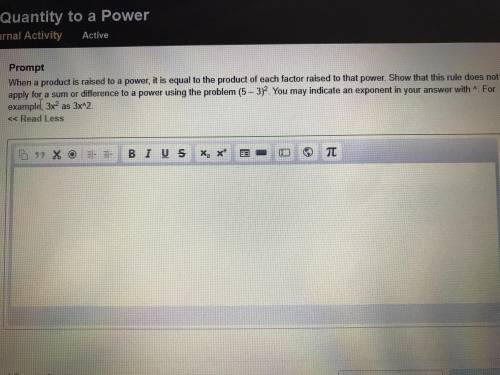
Mathematics, 06.04.2020 18:46 Weser17
When a product is raised to a power, it is equal to the product of each factor raised to that power. Show that this rule does not apply for a sum or difference to a power using the problem (5-3)^2.


Answers: 2


Another question on Mathematics

Mathematics, 21.06.2019 17:10
Consider the functions below. function 1 function 2 function 3 select the statement which is true about the functions over the interval [1, 2] a b function 3 has the highest average rate of change function 2 and function 3 have the same average rate of change. function and function 3 have the same average rate of change function 2 has the lowest average rate of change d.
Answers: 3

Mathematics, 21.06.2019 17:30
Jabari is power washing houses for a summer job. for every job, he charges an initial fee plus $30 for each hour of work. his total fee for a 4 -hour job, for instance, is $170 . jabari's total fee,f, for a single job is a function of the number,t, of hours it takes him to complete the job. write the function's formula.
Answers: 2


Mathematics, 21.06.2019 22:20
Line segment eg is partitioned by point f in the ratio 1: 1. point e is at e (0, 4), and point f is at (1, 3). what are the coordinates of point g? (−1, 5) (2, 2) (3, 1) (4, 0)
Answers: 2
You know the right answer?
When a product is raised to a power, it is equal to the product of each factor raised to that power....
Questions


Mathematics, 18.05.2021 18:50




Mathematics, 18.05.2021 18:50

Biology, 18.05.2021 18:50

Mathematics, 18.05.2021 18:50

Mathematics, 18.05.2021 18:50

World Languages, 18.05.2021 18:50

Mathematics, 18.05.2021 18:50



English, 18.05.2021 18:50




Mathematics, 18.05.2021 18:50

Mathematics, 18.05.2021 18:50




